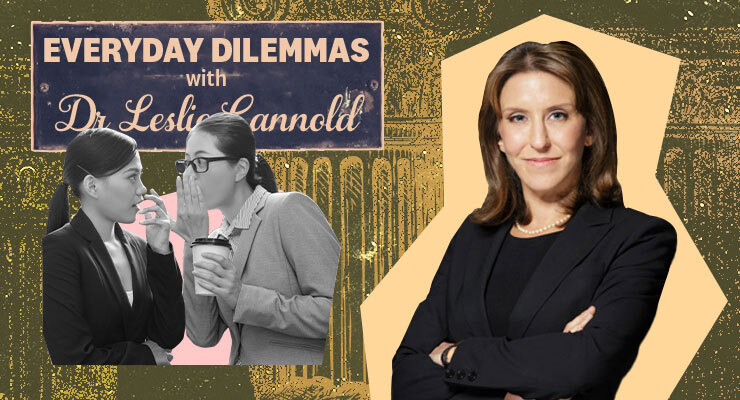
In Everyday Dilemmas, Dr Leslie Cannold uses her ethical training to help solve your problems. Send your questions to letters@crikey.com.au with “Dear Leslie” in the subject line. She might even reply…
Dear Leslie,
My workmate and one-time friend is telling tales about me to my subordinates. I’m worried he’s telling management, too. The truth is that he’s doing it to cover his own inadequacies. I don’t want to say that because I don’t think people trust gossips, but how do I set the record straight — and get him to stop?
Deflated in Darabin
Dear Deflated,
Gosh, people can be awful sometimes. Why can’t they just go to work and do their jobs? But they can’t, and they don’t. So here we are.
My advice is to have a word with your direct and senior managers. Explain the problem (without repeating any of your colleague’s false claims) and what you think is the cause of the white-anting. And while you’re at it, drop in a one-line, evidence-based denial along the lines of: “As my exceeding of all my KPIs last year shows…” Keep it brief and general, neutralising the damage should the scuttlebutt reach their ears.
Shutting your colleague’s loose lips is harder, although your view that the source of the problem is his low self-esteem is helpful if correct. Given you were once friends, can you ask him to lunch and ask directly about the comments? Something along the lines of: “I know you’ve been saying this, and I wondered if we could discuss it and clear the air?”
This can work if your colleague wants what you do — which is to solve the problem so it goes away. If he wants to continue causing you grief, this won’t work, and I’d advise speaking to your colleagues who can be inoculated by a heads-up similar to the one you provided to management.
Eventually everyone will know what you do about your colleague’s interpersonal limitations and if he doesn’t get sacked, he’ll certainly suffer reputational damage. You, however, will be more esteemed for refusing to retaliate and acting constructively to solve the problem, even if — this time around — those efforts failed.
Best,
Leslie
Dear Leslie,
I was crossing a footbridge yesterday when I saw five workers on the tram tracks below. Suddenly I saw a tram hurtling towards them, clearly out of control. I thought about throwing myself on to the tracks in the hope of diverting the tram, but I’m a pee-wee and not much over 50 kilograms soaking wet.
Luckily there was a fat man beside me who I knew could stop the tram if I hurled his burly body on to the tracks. Which is exactly what I did: heaved the bloke over and saved the lives of all five workers.
Question is, did I do the right thing?
Confounded in Carnegie
Dear Confounded,
Ha! Very clever. And since it’s been a slow week for letters (come on folks — send me your dilemmas) I’ll take the bait and indulge in some trolleyology.
In short, my answer is no. I don’t think you did the right thing, although I acknowledge that the moral theories we tend to revere don’t make it clear what the right thing is.
One of those theories, consequentialism, says your moral instincts were perfect. According to the strand of this moral framework endorsed by Australian philosopher Peter Singer, the right thing to do is the thing that generates the greatest good for the greatest number. By sacrificing the life of the fat man, you saved five lives, which anyone who can add up would agree is a better outcome than saving the fat guy but allowing five workers to be mown down.
But while this clearly accorded with your moral instincts, you’re in the minority. Most people, and particularly women, draw the line at harming one person, even if it’s to save more than one.
This may be because we believe that what makes an action right comes down to more than just it’s consequences — like, the actor’s motivations for killing the fat man or the view that the fat man has an inalienable right to life that can’t be denied, no matter how much killing him might benefit others.
Or we could just have an emotional aversion to causing harm to someone else with our own hands — a hypothesis backed by brain-imaging evidence. While hard-nosed philosophers might dismiss such impulses as irrational failures to “bite the bullet”, I disagree. Instead I see such moral instincts as the backbone of our humanity, given that an absence of empathy is the core characteristic of the “dark triad” of antisocial human traits: psychopathy, narcissism and Machiavellianism.
Keep well, my cheeky friend, and stay off those footbridges,
Leslie
Send your dilemmas to letters@crikey.com.au with “Dear Leslie” in the subject line and you could get a reply from Dr Cannold in this column. We reserve the right to edit letters for length and clarity.








Crikey is committed to hosting lively discussions. Help us keep the conversation useful, interesting and welcoming. We aim to publish comments quickly in the interest of promoting robust conversation, but we’re a small team and we deploy filters to protect against legal risk. Occasionally your comment may be held up while we review, but we’re working as fast as we can to keep the conversation rolling.
The Crikey comment section is members-only content. Please subscribe to leave a comment.
The Crikey comment section is members-only content. Please login to leave a comment.